
When you're in the middle of a coughing attack, gasping for breath or struggling to sleep, you can feel helpless to do anything to make it stop.
Not even pharmaceuticals are of much help: A November 2014 Cochrane review revealed that over-the-counter cough meds performed no better than a placebo.
Video of the Day
Video of the Day
But get this: Some natural remedies can work surprisingly well. The next time a persistent cough interferes with your shut-eye, job productivity or just everyday living, try one of these "hacks" to soothe your symptoms.
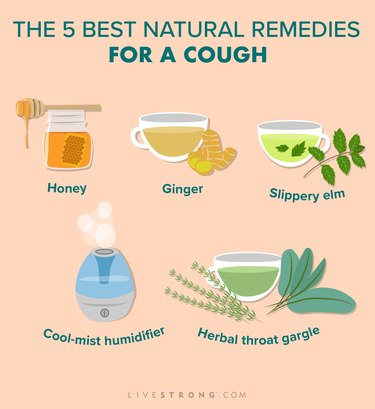
1. Honey
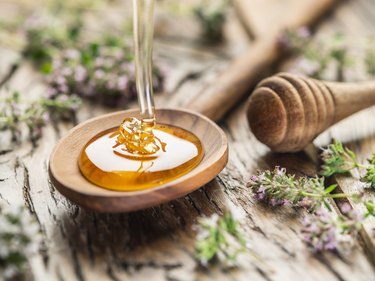
Listen up, honey: This folksy remedy can put the brakes on a cough.
In an April 2021 review in the British Medical Journal, honey was determined to reduce cough frequency and severity better than over-the-counter cough syrup. And an August 2012 study in Pediatrics maintained that it improved sleep quality when given at bedtime.
"Honey acts as a cough suppressant and has been found to be as effective as dextromethorphan [a common cough syrup ingredient] and more effective than Benadryl," Lynn Gershan, MD, medical director of integrative health and wellbeing at University of Minnesota Medical School, tells LIVESTRONG.com. "That is pretty powerful research."
In addition, she says, honey is a demulcent. "That means it coats the inflamed area of the throat and soothes and calms irritated nerves."
You may have heard some buzz about manuka honey, produced by bees who pollinate the manuka plant, a flowering shrub found in New Zealand and Australia. This expensive food has been touted by health gurus and celebrities, but is it worth the sky-high price?
Some of the hype may have come after an April 2016 study in Frontiers in Microbiology suggested that manuka honey has higher levels of antibacterial activity, perhaps thanks to the unique phytochemicals found in the nectar that the bees pollinate. But Dr. Gershan isn't sold. "Studies have tested many different kinds of honey, and they all work to alleviate a cough," she says.
The bottom line: Honey is the fastest, easiest way to stop coughing. All you need to do is let a teaspoon or two dissolve on your tongue whenever a hack attack comes on. Plus, it's all-natural and chemical-free. Just don't give honey to children younger than 1, due to the risk of infant botulism.
How to Take Honey for a Cough
Simply eating a spoonful of honey will do the trick, but to boost the health effects even more, make thyme or sage honey. “These herbs have antibacterial and antiviral effects,” Dr. Gershan says.
- Fill a sanitized jar about halfway up with finely chopped fresh sage or thyme, or one-third of the way up with dried herbs. Add honey until the jar is almost full.
- Put the lid on and let it infuse for at least one week in a cool, dry place.
- Then, warm the mixture in a pan over low heat and strain out the herbs with a fine mesh sieve.
- Take a spoonful or two as needed for cough relief.
2. Ginger
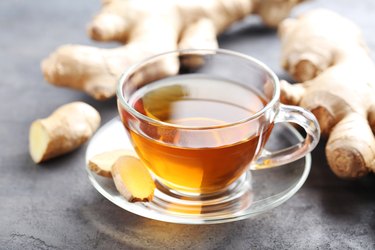
This earthy spice might help alleviate a cough. In a January 2013 Journal of Enthnopharmacology study, fresh ginger steeped in hot water counteracted infection from a common cold virus.
But that's not all: "Ginger has a prokinetic effect, meaning it helps move food through your stomach and small intestine," Dr. Gershan says. If you have a cough due to reflux, ginger might speed up your digestion, making you less likely to regurgitate.
How to Take Ginger for a Cough
Brew a cup of ginger tea, either using store-bought tea bags or concocting a homemade version: Thinly slice a one-inch piece of ginger and simmer it in 1 cup of water in a saucepan for several minutes.
As for ginger chest wraps, where you wrap a paste of grated ginger in gauze and place it on your upper torso? There’s no evidence showing this eases cough and congestion. “Still, ginger is warming, and it feels good to have something warm on your chest,” Dr. Gershan says.
3. Slippery Elm
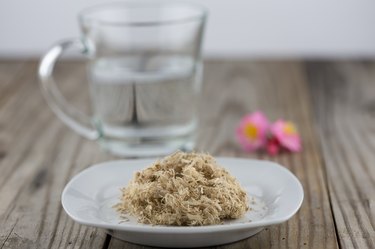
Slippery elm is a species of elm tree native to North America. For hundreds of years, herbalists have used its bark to soothe coughs.
"Slippery elm is a demulcent, just like honey," Dr. Gershan says. "It forms a gel that coats the throat and esophagus and soothes irritation, so it's good for both a chronic cough and reflux."
How to Take Slippery Elm for a Cough
Dr. Gershan likes Thayer’s Slippery Elm Lozenges and Traditional Medicinals' Throat Coat Tea, which contains slippery elm and marshmallow root, another demulcent.
“Suck on a lozenge every couple of hours or have two to three cups of tea throughout the day while symptoms persist,” Dr. Gershan says.
4. Cool-Mist Humidifier
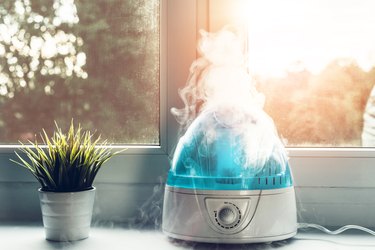
This old-school method is a keeper, especially when it comes to home remedies for a dry cough at night.
"Dry air is irritating, so a humidifier can help with a cough," Dr. Gershan says. "Moist air thins the mucus, making it easier to breathe."
What's more, a May 2019 study in PNAS found that we can fight off infection better in a humid environment compared to an arid one.
Tip
Make sure to thoroughly clean your humidifier on a regular basis to prevent mold and mildew from growing.
5. Herbal Throat Gargle
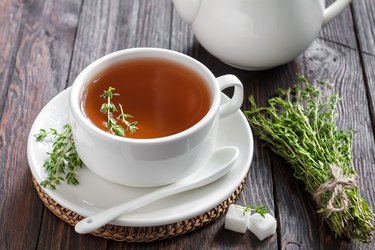
Sage and thyme do more than add flavor to a batch of roasted veggies. A June 2014 study in the Journal of Traditional and Complementary Medicine noted that sage has antibacterial, antioxidant, anti-inflammatory and antiviral effects. And a 2015 review in Complementary Medicine Research concluded that thyme-based remedies significantly reduced cough frequency and severity.
Dr. Gershan points out that if you have a wet cough or your throat feels clogged with phlegm, a sage or thyme gargle is the fastest way to get mucus out of your lungs. "Essential oils in the leaves thin the mucus, and warm fluids help dissolve it," she says.
Good to know: If you're trying to cough up stubborn phlegm, avoid throat-coating demulcents like honey, slippery elm and marshmallow root.
How to Do an Herbal Throat Gargle
- Fill a tea ball with 1 to 2 teaspoons of dried or finely chopped fresh sage and/or thyme.
- Place the tea ball in a mug and pour hot water over it. Let it steep for several minutes.
- Making sure the liquid isn't too hot, gargle it for about 30 seconds.
- Repeat as needed.
What About Vitamins?

Eating a nutritious diet might protect you from getting sick in the first place.
"Vitamins can help support the immune system as the body fights off an infection," Dr. Gershan says. "That said, they won't stop an existing cough or coughs caused by reflux."
Vitamin A, for instance, has anti-inflammatory properties and plays a key role in the growth and maintenance of new tissues and cells — particularly when it comes to lung function. In an April 2014 study in the Journal of Nutrition, a vitamin A deficiency was associated with increased risk of cough.
As for vitamin C? Sorry to break it to you, but a glass of OJ or Emergen-C probably won't ease your symptoms. A January 2013 review in the Cochrane Database of Systemic Reviews found that vitamin C is unlikely to alleviate cold severity or duration.
If you do choose to pop a vitamin when you're sick, stick to the recommended daily amount: 65 mg of C and 700 mcg of A for adults assigned female at birth; 90mg of C and 9 mgc of A for adults assigned male at birth.
"Taking more than that is not helpful," Dr. Gershan says. "You'll just pee out the excess vitamin C, but too much vitamin A can be toxic because it's stored in the liver."
Her first choice: "Meet your nutritional requirements through healthy food, rather than supplements," Dr. Gershan says.
According to the National Institute of Health (NIH), the best sources of vitamin A include liver, orange and yellow produce, leafy greens, dairy and oily fish. And foods rich in vitamin C include guava, red and green bell peppers, kiwi, broccoli, strawberries and Brussels sprouts.
What About Pineapple?

Lately, a graphic claiming that pineapple juice is five times more effective than cough syrup has been making the social media rounds. Word on the street is that it fights bacteria, thins mucus and reduces inflammation.
Although Dr. Gershan can't attest to the tropical fruit's effectiveness and no research has been done to date on its ability to cure a cough, she admits it could work to fight phlegm.
"Think about that sensation of having thick mucus stuck in the back of your throat, and since you can't cough it out, it keeps irritating you," Dr. Gershan says. "Drinking something acidic, like pineapple juice, might help thin the mucus so that you can cough it up more easily."
Hey, it's worth a shot!
What About Apple Cider Vinegar?
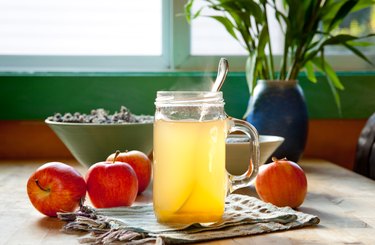
The theory behind apple cider vinegar for a cough is that its antimicrobial properties can kill the germs that cause hacking. A prospective study published in Scientific Reports in January 2018 found that it inhibits bacterial growth and alleviates inflammation.
"It will not suppress a cough," Dr. Gershan says. "But it is pretty acidic, so it might help loosen congestion." Plus, because chronic coughing can cause inflammation, it could be a promising method to slash swelling.
Want to give apple cider vinegar a try? Combine it with other natural cough relievers using this homemade cough syrup recipe:
- Mix together ¼ teaspoon dried ginger, 1 tablespoon honey, 2 tablespoons hot water, 1 tablespoon apple cider vinegar and a few squeezes of lemon juice.
- Take 1 teaspoon at a time, as needed.
When to See a Doctor About a Cough
Most coughs aren't worrisome and will clear up on their own. But occasionally, it's indicative of a more serious issue.
According to the American Lung Association, you should contact your health care provider if any of the following are true for you:
- You've been exposed to COVID-19.
- The cough persists longer than eight weeks.
- You have other symptoms, including a fever, headache, fatigue or trouble breathing.
- Your phlegm is greenish-yellow.
- You're coughing up blood.
- It sounds like you're wheezing, whooping or barking.
Why Am I Coughing So Much?
As annoying as coughing might be, under normal circumstances it plays an important role in your overall health. According to the American Lung Association, when something irritates your airway — like dust, germs or smoke — your body responds by coughing. This expels the bothersome particles and protects your airway from infection and inflammation.
Common causes of coughing include:
- Upper respiratory tract infection (say, from a cold or the flu)
- Hay fever
- Smoking
- Poor air quality (pollution, wildfire smoke, etc.)
- Reflux (when stomach acid or undigested food flows into the esophagus)
Some coughs are dry or nonproductive; others are wet or productive, meaning you're hacking up mucus. "If you have a bacterial or viral infection, the microbes stimulate glands in the nasal passage and back of the throat, which respond by producing mucus as a protectant," Dr. Gershan says.
You heard that right: The gooey slime you're spitting into the sink actually shields your body from germs. A July 2018 study in Nature found that mucus acts as an antimicrobial barrier. It helps stave off infection by coating the throat and lungs, making it more difficult for pathogens to take hold.
According to MIT, the sticky stuff also traps microbes, preventing them from going any further inside your body. Meanwhile, the antibodies contained in mucus attack the invaders until you blow your nose or hock a loogie.
Why Do Coughs Get Worse at Night?
It's a cruel twist of fate: Bedtime is when we most crave relief from coughing, but for many of us, it also happens to be when our cough ramps up.
Part of the reason is thanks to gravity: "If you're reclined, mucus pools in the back of your throat and irritates the nerve endings there," Dr. Gershan says. "And if your cough is from reflux, stomach acid is more likely to come up when you're lying down."
Your bedroom itself might also be to blame. "If you sleep in a dry environment — say, if you have a forced-air heating system — the lack of humidity might cause you to cough," Dr. Gershan says. "Plus, sometimes you simply notice a cough more at night because there are fewer distractions."
- Scientific Reports : "Antimicrobial activity of apple cider vinegar against Escherichia coli, Staphylococcus aureus and Candida albicans; downregulating cytokine and microbial protein expression"
- Saudi Journal of Biological Sciences: "The antibacterial activities of honey"
- Frontiers in Microbiology: "Therapeutic Manuka Honey: No Longer So Alternative"
- British Medical Journal: "Effectiveness of honey for symptomatic relief in upper respiratory tract infections: a systematic review and meta-analysis"
- Pediatrics: "Effect of honey on nocturnal cough and sleep quality: a double-blind, randomized, placebo-controlled study"
- Journal of Enthnopharmacology: "Fresh ginger (Zingiber officinale) has anti-viral activity against human respiratory syncytial virus in human respiratory tract cell lines"
- Journal of Nutrition: "Vitamin A deficiency is associated with gastrointestinal and respiratory morbidity in school-age children"
- Cochrane Database of Systemic Reviews : "Vitamin C for preventing and treating the common cold"
- American Lung Association: "Learn About Cough"
- Nature: "Evolutionary conservation of the antimicrobial function of mucus: a first defence against infection"
- NIH: "Vitamin A"
- Pharmacognosy Research : "Honey and Health: A Review of Recent Clinical Research"
- PNAS: "Low ambient humidity impairs barrier function and innate resistance against influenza infection"
- Journal of Traditional and Complementary Medicine : "Chemistry, Pharmacology, and Medicinal Property of Sage (Salvia) to Prevent and Cure Illnesses such as Obesity, Diabetes, Depression, Dementia, Lupus, Autism, Heart Disease, and Cancer"
- Complementary Medicine Research : "Herbal Medicine for Cough: a Systematic Review and Meta-Analysis"
- MIT: "Mucus Does More Than You Think"
- Cochrane: "Over‐the‐counter (OTC) medications for acute cough in children and adults in community settings "
Is this an emergency? If you are experiencing serious medical symptoms, please see the National Library of Medicine’s list of signs you need emergency medical attention or call 911.